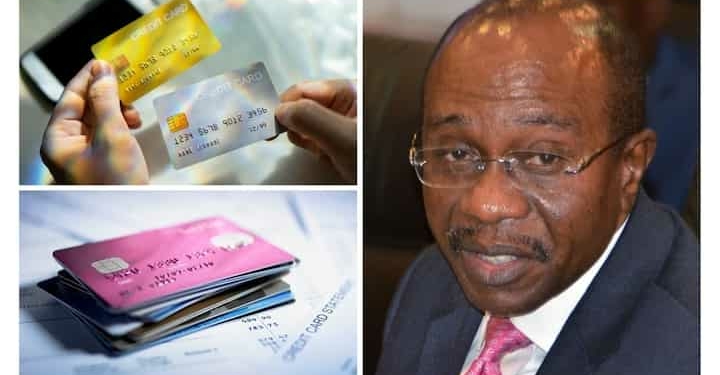The Central Bank of Nigeria (CBN), on Thursday 26th of January, 2023, unveiled and officially launched the country’s domestic card scheme. The Domestic card scheme was first disclosed by the commission in 2022 when CBN spokesperson, Osita Nwanisobi, said the scheme would accelerate financial inclusion and deliver lower-cost payments services that are more accessible and affordable for Nigerians.
According to Godwin Emefiele, governor of the CBN, the national domestic card scheme known as AfriGo is aimed at creating a more robust payment system that would drive financial inclusion in the country. He said with the launch of the card, all foreign charges on foreign payment cards would be cut off. Although, the existing cards (Visa, Master card, verve) would remain, charges on all cards would henceforth be paid in naira, except for international transactions.
“At this time when foreign exchange challenges persist globally, it is important for me to say that we have come up with this card to ensure that all card online transactions will now effective immediately, begin to go on the Nigerian National Domestic System.
“We will only pay dollars for charges on transactions that are done outside Nigeria. NIBSS, the CBN and Nigerian banks will work together to see how to segregate those transactions. To ensure that we pay fees or charges for international transactions that are conducted on both domestic cards, Visa or Master Cards, as they are known today.” Emefiele said.
However, questions as to how Nigerians would accept this new scheme, especially during the period when financial penetration is still low have raised some concerns. The Financial exclusion rate in Nigeria is 36 percent. Although Nigeria has a higher proportion of banked adults than many countries, it also has a high proportion of financially excluded adults.
This means that a greater number of Nigerians have not been able to access banking and financial services in recent years, unlike citizens of other countries on the African continent, especially in the Sub-Saharan African countries. EFInA Access to Financial Services in Nigeria 2020 Survey revealed that the National Financial Inclusion Strategy targets for 2020 will not be met until around 2030.
This is a major challenge for Nigerians, Samuel Oyekanmi, a Financial Analyst told Within Nigeria. Oyekanmi noted that Nigerians are still finding it hard to deal with the issue around the cashless policy, tallied with the redesign of the naira notes and then the reduction of withdrawals and the adoption process for the national domestic card scheme might be slow and difficult.
“Nigerians do not have access to new notes, major banks have decided not to load funds in their machines cause they don’t have the new notes and do not want to circulate old notes especially since the deadline is approaching. But the truth is that going forward, that’s going to be our reality. So it’s going to be a big issue cause most petty traders and small businesses in Nigeria do not really have so much trust in digital banking, the fact that we still have a very large infrastructural gap, we still carry our transactions, you get debited and you still do not get your funds, you definitely have issues around stuffs like this.
We have a very big issue around our financial system that is going to discourage Nigerians to adopt but of course when you do not have so much options, you just have to evolve, you just have to innovate.” he said.
Oyekanmi, however, opined that regardless of the adoption process, the scheme will drive more financial inclusion in the economy, and help the government generate enough revenue through taxation.
“The beauty about it is that in Nigeria right now we have very high inflation and at the same time very high-interest rate, unfortunately, it is not curbing inflation in Nigeria that’s because a larger chunk of Nigerians are outside the financial system and when they are outside the financial system, whatever policy that you tweak or adjust, it’s not going to affect them, because the money is just going to keep moving around and won’t find it’s way to the bank.
“I think as of Nov, we gave over 80% of the funds in circulation being outside banks, which means it’s just moving around from one person to another, so it gives you an idea as to why the CBN will want to as much as possible reduce the funds that is is lying around. It can mop up excess liquidity, and you see your monetary policy tools being relatively functional and effective in fighting inflation, I think that is also going to help, the CBN have a better grasp of the economy.” Oyekanmi said.
Oyekanmi who expressed optimism about the scheme said that “if Nigerians follow up with this policy which in the real sense is hard, a combination of all these policies will drive huge growth in the financial system, digital penetration, the economy as a whole and could even help us see our exchange rate being stable or some breach the gap between the official and parallel market”



Discussion about this post